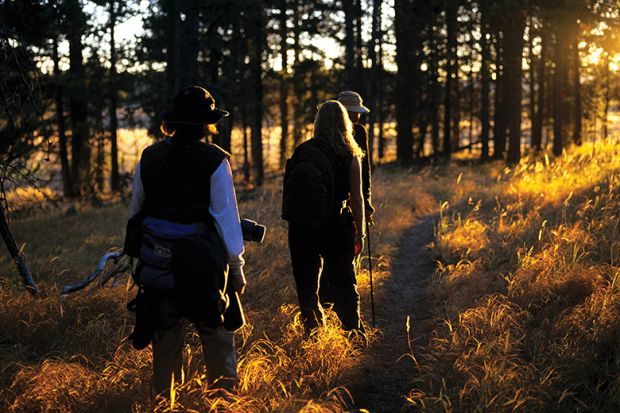It was while she was transcribing her interviews that Itzel San Roman Pineda realised that the harassment she had experienced while conducting fieldwork in Mexico had followed her home. “I could hear what the men were saying to me again,” she said.
Ms San Roman Pineda, a researcher in human geography at the University of Sheffield, described the community she had been working in as “very sexist” and blighted by alcoholism. “I had to go to my room at 4pm or 5pm every night because after that I was afraid for my safety,” she said.
After a conversation in a pub with Ana Zavala Guillén, a British Academy postdoctoral fellow at Queen Mary University of London, the pair realised that this was “a topic we talk about with other women informally, but it is largely ignored in academia”, in Ms San Roman Pineda’s words.
Dr Zavala Guillén, for her part, had encountered violence while conducting research in Colombia and was experiencing anxiety about her next round of fieldwork.
THE Campus resource: Cybersecurity in online learning
Together, the pair decided to set up the Network of Women doing Fieldwork, which aims to raise awareness of the gender-based harassment female researchers regularly face in the field, support women who experience it, encourage institutions to improve their safeguarding strategies and, ultimately, get to the point where women can develop their professional careers free from fear of abuse, harassment and discrimination.
The group hopes to get funders and institutions to understand that risk assessments need to better highlight gender vulnerability and that budgets need to support mechanisms that keep women safe while collecting data in the field. For example, a private driver could help women working in volatile areas, Dr Zavala Guillén said.
She also wants the group to help “break out of the idea that the Global South is a dangerous place to work, and this is not something that happens in the North”. In an upcoming seminar, “we will have a researcher discussing the violence she experienced doing research in Manchester”, for example.
The problem was that research structures made it hard for women to speak out, the pair argued. “In a previous university, some colleagues expressed concern, saying: ‘If this became public, funders won’t be willing to fund women doing this kind of research because it’s going to be more expensive if we need to put additional measures in place,’” Dr Zavala Guillén said.
Ariana Markowitz, another member of the network, who is researching extreme and chronic urban violence for her PhD at UCL, agreed. For example, there’s an incentive to apply for low-risk ethics review if you can because the high-risk review takes so much more time, she explained.
Ms Markowitz, who experienced secondary trauma including nightmares and insomnia after particularly troubling fieldwork, said not addressing the harassment women faced also affected the research that is produced.
“If I’m struggling to navigate risks unsupported or with limited support, I have less capacity to be attuned to my participants’ needs, which makes for less powerful research at best and treating people unfairly or putting them in harm’s way at worst.”
The women in the network told Times Higher Education that they wanted to see a cultural change in academia. Women often don’t speak out because they fear it will be dismissed or told it is “normal” or get advice that comes in the form of “don’t wear skirts, don’t drink”, shifting the blame unnecessarily to women.
It reflects the wider conversations about women’s safety across the UK and elsewhere that have come to the forefront recently following the abduction and killing of Sarah Everard, Ms Markowitz said. “We internalise all these things that we’re supposed to do to keep ourselves safe, but then [others] don’t,” Ms Markowitz said.
“We need a recognition that this is widespread, not just conversations that happen at the edges of conferences or in the pub. We want to normalise talking about this, so that women don’t feel ashamed…And we want men to be involved in this, too.”
Dr Zavala Guillén also wants to help develop training for mentors and supervisors and those who make decisions in safety assessments. “We can’t have people saying: ‘I was lucky because my supervisor was good about this,’ because we can’t rely on luck,” she said.
POSTSCRIPT:
Print headline: Make work in field safer, say female researchers
Register to continue
Why register?
- Registration is free and only takes a moment
- Once registered, you can read 3 articles a month
- Sign up for our newsletter
Subscribe
Or subscribe for unlimited access to:
- Unlimited access to news, views, insights & reviews
- Digital editions
- Digital access to THE’s university and college rankings analysis
Already registered or a current subscriber? Login










